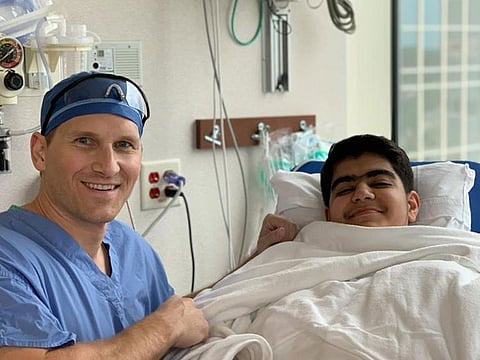Why this 14-year-old Emirati boy needed a meniscus transplant?
After a successful surgery, Ahmad is now studying medicine

Also In This Package
Dubai: A teenage Emirati boy, born with a rare lateral Discoid Meniscus (DM), was operated upon by surgeons of Mayo Clinic, United States and partially underwent surgery for growth plate removal in the UAE, to be able to avert severe arthritis that could have been triggered owing to his congenital condition.
Ahmad Amer Sharif, now 16, the son of Dr Amer Sharif, Chair of Dubai’s COVID Command and Control Centre, was born with a congenital lateral DM, which was causing pain, swelling, frequent snapping sound in the knee due to misalignment and could have resulted in arthritis in later years.
What is a meniscus?
A meniscus is a C-shaped piece of tough, rubbery cartilage in our knee that acts as a shock absorber between the shinbone and the thighbone. It is normally horseshoe shaped or like a half crescent. However, in case of a congenital discoid meniscus, it is shaped like a disc.
A series of surgeries
Since lateral discoid meniscus is extremely rare, occurring only in 0.1-0.3 per cent individuals, Ahmad’s father took him to Germany when he was 13, to trim his meniscus. However, that was not successful as the teenager developed pain and cartilage wear. It became increasingly harder for Ahmad to walk properly, exercise or play tennis (something his brother and he both enjoyed) due to the pain and discomfort caused by his condition.
Meniscus transplant in US
Therefore, in 2019, when Ahmad was 14, he was flown to Mayo Clinic, United States in 2019 for meniscus transplant using an allograft (donor tissue) and knee realignment.
Dr Aaron Krych and Dr Todd Milbrandt, orthopaedic and paediatric surgeons at Mayo Clinic conducted the rare surgery. While Dr Krych specialises in sports medicine, Dr Milbrandt specialises in paediatrics. This was truly an unprecedented case where a team of Mayo Clinic surgeons from different specialisations came together to help a patient in need.
A medical perspective on Discoid Meniscus
Giving a medical perspective on the case Dr Milbrandt told Gulf News: “While DM affects 3-5 per cent children worldwide, its crescent shape and the quality of the tissue can impact the life of the individual who suffers from it congenitally. The tissue of a discoid meniscus is also not as organised and easily tears (compared with normal meniscus).”
A congenital condition that can affect the quality of life
Dr Milbrandt continued, “If the discoid meniscus does not tear, then it may not have any impact on a patient’s life. However if it does tear, then there can be increased pain, locking of the knee and eventual early arthritis as the cartilage on inside of the knee is injured. The patient should undergo surgery to correct the condition especially when he is suffering from a swelling in the knee or some locking sensation. Without a functioning meniscus, the impact can be great — in the range of 7 or 8 on a scale of 1-10 in the ascending order.”
Meniscus transplants have a good prognosis
Talking about the success of meniscus transplants in such cases, Dr Milbrandt added: “Patients who undergo such transplants can live a healthy life, provided they undergo regular physical rehabilitation to keep the thigh muscle strong. Recent publications suggest a 75 per cent survival of the transplant for more than ten years. Long-term studies on this topic haven’t been published yet.”
Growth plate removals conducted in Dubai
Later, owing to the pandemic, when Ahmad was unable to travel back to the US for removal of the growth plates implanted in the knee, the procedure was carried out in Dubai. During the transplant, a small growth plate is used to temporarily slow one-half of the growth area around the knee. This then allows the other half to continue to grow, thus causing a straightening of the leg. The team wanted to do this to decrease the pressure on the transplanted graft. The growth plate was subsequently removed at a Dubai hospital, once optimum results were achieved.
Thanks to the Mayo Clinic US and Dubai surgeries, and rigorous physical rehabilitation schedules, the young boy has resumed his normal life. Ahmad’s father, Dr Sharief, told Gulf News: “Ahmad is doing great and is back to his normal activities, including playing tennis. He is happy, comfortable and he’s pain-free. Many thanks to the team at Mayo for its kind care. Ahmad just graduated this year and recently got accepted in the medical school.”








